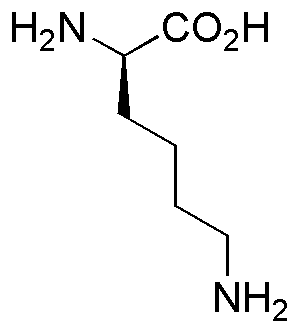D-Lysine is widely utilized in research focused on:
- Animal Nutrition: Commonly used as a dietary supplement in animal feed to enhance growth and improve feed efficiency, particularly in poultry and swine industries.
- Pharmaceuticals: Serves as a building block for the synthesis of various pharmaceuticals, including those aimed at treating lysine deficiency and certain metabolic disorders.
- Cosmetics: Incorporated in skincare products for its moisturizing properties, helping to improve skin hydration and elasticity.
- Food Industry: Used as a food additive to fortify products, ensuring adequate protein intake, especially in vegetarian and vegan diets.
- Biotechnology: Plays a crucial role in recombinant DNA technology, aiding in the production of proteins and enzymes that require lysine for optimal function.
General Information
Properties
Safety and Regulations
Applications
D-Lysine is widely utilized in research focused on:
- Animal Nutrition: Commonly used as a dietary supplement in animal feed to enhance growth and improve feed efficiency, particularly in poultry and swine industries.
- Pharmaceuticals: Serves as a building block for the synthesis of various pharmaceuticals, including those aimed at treating lysine deficiency and certain metabolic disorders.
- Cosmetics: Incorporated in skincare products for its moisturizing properties, helping to improve skin hydration and elasticity.
- Food Industry: Used as a food additive to fortify products, ensuring adequate protein intake, especially in vegetarian and vegan diets.
- Biotechnology: Plays a crucial role in recombinant DNA technology, aiding in the production of proteins and enzymes that require lysine for optimal function.
Documents
Safety Data Sheets (SDS)
The SDS provides comprehensive safety information on handling, storage, and disposal of the product.
Product Specification (PS)
The PS provides a comprehensive breakdown of the product’s properties, including chemical composition, physical state, purity, and storage requirements. It also details acceptable quality ranges and the product's intended applications.
Certificates of Analysis (COA)
Search for Certificates of Analysis (COA) by entering the products Lot Number. Lot and Batch Numbers can be found on a product’s label following the words ‘Lot’ or ‘Batch’.
*Catalog Number
*Lot Number
Certificates Of Origin (COO)
This COO confirms the country where the product was manufactured, and also details the materials and components used in it and whether it is derived from natural, synthetic, or other specific sources. This certificate may be required for customs, trade, and regulatory compliance.
*Catalog Number
*Lot Number
Safety Data Sheets (SDS)
The SDS provides comprehensive safety information on handling, storage, and disposal of the product.
DownloadProduct Specification (PS)
The PS provides a comprehensive breakdown of the product’s properties, including chemical composition, physical state, purity, and storage requirements. It also details acceptable quality ranges and the product's intended applications.
DownloadCertificates of Analysis (COA)
Search for Certificates of Analysis (COA) by entering the products Lot Number. Lot and Batch Numbers can be found on a product’s label following the words ‘Lot’ or ‘Batch’.
*Catalog Number
*Lot Number
Certificates Of Origin (COO)
This COO confirms the country where the product was manufactured, and also details the materials and components used in it and whether it is derived from natural, synthetic, or other specific sources. This certificate may be required for customs, trade, and regulatory compliance.


